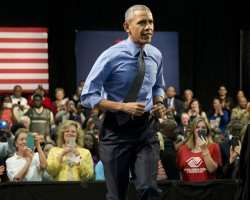Poll: Obama's approval rating now better than that of Ronald Reagan

It's funny to think back to the 2014 midterms and what the chattering class was saying after Republican gains. President Obama was “finished,” Americans were told. The election results were a stinging rebuke to the White House and its agenda, and unless Democrats wanted to invite the public's fury, Obama would have no choice but to give up on his ambitions and start giving the Republican Congress at least some of what the GOP wanted.
The president proceeded to ignore all of these assumptions, pursuing his agenda with the increased enthusiasm of a leader who recognized he needed to make the most of his remaining time in office.
If Republicans assumed Obama would face some kind of backlash for governing this way, they're no doubt disappointed with the results. The Washington Post reported over the weekend on the president's vastly improved standing.
When the ball dropped in Times Square on Jan. 1 of this year, more than half of the country disapproved of the job that President Obama was doing, according to Gallup. That boded poorly for the Democrats over the course of the year; presidential approval correlates to both how his party fares in the presidential race (even if he's not on the ticket) but also to the results of Senate races. An unpopular Obama suggested a less popular whoever-was-about-to-win-the-Democratic-nomination.
But over the course of the year, Obama's approval numbers changed – quickly, and a lot. In Gallup's most recent weekly average, Obama is at 51-45 – the exact opposite of where he was on Jan. 1 and a 12-point swing since then. He's been at 50 percent or higher in every week since March 1, save one.
The Post's analysis was based on Gallup data, but even if we take a broader view and consider the president's average standing across all of the recent polling, Obama not only finds his head above water – supporters outnumber detractors – but he's also currently seeing his strongest support in three years.
There's no one explanation for this. Some have argued his improved standing is the result of several recent governing successes. Others point to steady economic gains. Many have suggested Americans aren't overjoyed with the president's would-be successors, prompting some voters to say, “You know, maybe that Obama guy isn't so bad after all.”
Whatever the cause, every Republican – and every pundit, for that matter – who said in November 2014 that the president might as well give up on trying to get anything done was mistaken. The more Obama has done in the last quarter of his presidency, the stronger his public support.
Revisiting our coverage from a few months ago, I'm not unsympathetic to the argument that Obama's approval rating is irrelevant, since he obviously can't seek another term. This might have some effect on historians' perspective when the president's legacy is being debated, but it's understandable that much of the political world would be far more interested in the latest general-election polls, not the president's latest level of support.
But don't be too quick to dismiss the significance of Obama's support. He won't literally be on the ballot, but there's little doubt the president's standing will have a real impact on the public's appetite – or lack thereof – for radical change in 2017 and beyond, and insiders in both parties will be keeping a close eye on Obama's numbers in the coming months.
What's more, this president will be the first two-term incumbent of the television era to aggressively hit the campaign trail during his last year in office, and the more popularity he enjoys, the greater the effects will be.
The L.A. Times reported a few months ago, “Obama's approval rating now is almost identical to that of President Ronald Reagan in his final year in office – the last time the incumbent's party won a third election in a row.”
For the record, according to Gallup, on this date in 1988, Reagan's approval rating was 48%. As of yesterday, Obama was at 52%.
